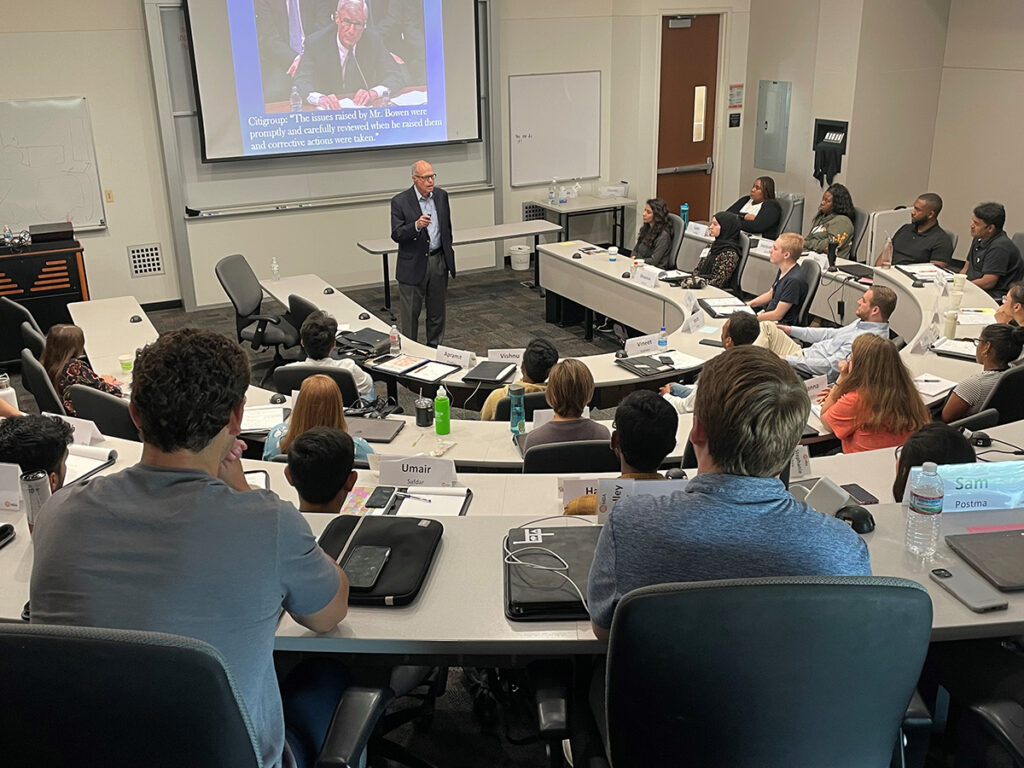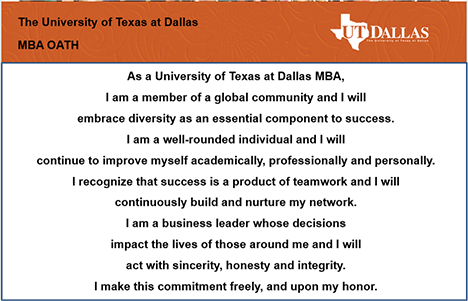
I recently spoke to the full-time MBA program at the University of Texas at Dallas for the tenth straight year!! These talks create a great opportunity for me to help students understand ethical issues and importance while gaining insight into what future business leaders face in their current professional settings. This 18-month MBA program is consistently highly ranked, and in 2023 was ranked #10 of all public universities by U.S. News and World Report.
One of the secrets of the program’s success is creating a structure in which all of their beginning students (typical class size of 50 students with five years of experience) attend a two-week LEAD camp (Leadership, Enhancement, Academic, Professional Development) in August, which prepares them with a wide range of seminars, workshops, lectures and activities as a kickoff to the school year.

I always speak on the last day of LEAD camp, before the students have their final session discussing the UTD MBA Manifesto (what they, as UTD MBA students believe) and the UTD MBA Oath, which was drafted by the MBA class of 2010, which all students agree to follow.
In my talk this year, I noted the absolute importance of ethical behavior as I told them my true-life story about how the lack of ethics in Citigroup and the other large banks led to the massive fraud that caused the financial crisis and the resulting financial ruin experienced by millions of people. I emphasized that a large part of the financial crisis could have been prevented if the banks had followed their own published ethics policies and listened to those few employees who tried to warn of the malfeasance and what they saw as blatant ethics violations.
We also discussed details of the many government cover-ups of the banking misdeeds that I encountered in attempting to hold the bank and executives accountable for the fraud. We talked about the broader perspective of government corruption, with my noting that the highly-respected annual study of government corruption in 180 countries worldwide by Transparency International, the Corruption Perceptions Index (CPI), shows that the United States has dropped out of the top 20 least-corrupt countries in the world with 23 countries now being less corrupt than the United States.
This led to a discussion about some of the significant ethics research the Ethics and Compliance Initiative has performed. That research helps the students identify whether or not a company has an ethical corporate culture.
In the follow-up Q&A session, the students fully recognized the need for ethical behavior and decision-making and the absolute importance of being true to themselves in their careers. This recognition, truly, is the only way our country can reverse the continued ethical decline of our country.

 Richard Bowen is widely known as the Citigroup whistleblower. As Business Chief Underwriter for Citigroup during the housing bubble financial crisis meltdown, he repeatedly warned Citi executive management and the board about fraudulent behavior within the organization. The company certified poor mortgages as quality mortgages and sold them to Fannie Mae, Freddie Mac and other investors.
Richard Bowen is widely known as the Citigroup whistleblower. As Business Chief Underwriter for Citigroup during the housing bubble financial crisis meltdown, he repeatedly warned Citi executive management and the board about fraudulent behavior within the organization. The company certified poor mortgages as quality mortgages and sold them to Fannie Mae, Freddie Mac and other investors.

